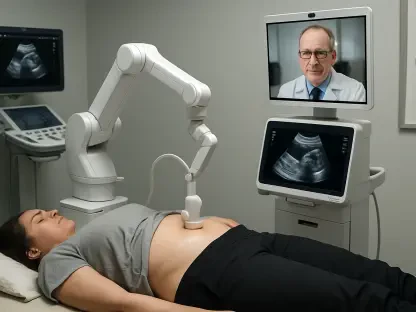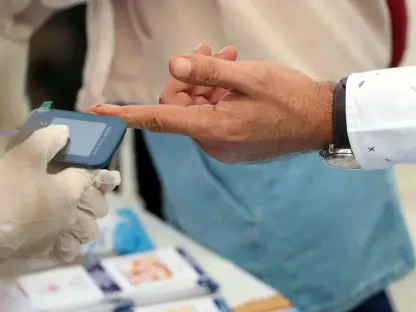Exploring a New Frontier in Cancer Detection
Imagine a world where a simple breath test, analyzed by trained dogs and cutting-edge technology, could detect cancer before any symptoms appear, potentially saving countless lives through early intervention. This vision is at the heart of a groundbreaking partnership between Hackensack Meridian Health, a leading healthcare network in New Jersey, and SpotitEarly, an innovative startup based in Israel. Their collaboration aims to pioneer early cancer detection by harnessing the extraordinary scent detection abilities of dogs alongside artificial intelligence (AI) to identify cancer biomarkers in human breath samples.
The central question driving this research is whether this unique blend of canine olfaction and AI can transform cancer screening into a more accessible, non-invasive process. By focusing on volatile organic compounds (VOCs) in breath, this approach seeks to detect disease signatures long before traditional methods would. If successful, it could redefine how cancer is diagnosed, particularly for those without access to conventional screenings.
Yet, significant challenges remain on this path to innovation. Validating the technology’s accuracy across diverse populations is critical, as is navigating complex regulatory landscapes to gain approvals like those from the FDA. Additionally, public acceptance of a diagnostic method involving animals poses a hurdle, requiring clear communication about its scientific foundation and ethical standards. Overcoming these obstacles could mark a pivotal shift in medical diagnostics.
The Urgent Need for Improved Cancer Screening
Cancer remains one of the leading causes of death worldwide, with late-stage diagnoses often diminishing the chances of successful treatment. Alarmingly, nearly two-thirds of cancer cases lack dedicated screening methods, resulting in detection only after the disease has progressed. This gap underscores a pressing need for tools that can identify cancer at its earliest, most treatable stages.
The impact of early detection cannot be overstated. According to the American Cancer Society, breast cancer detected at a localized stage boasts a five-year survival rate of 99%, a stark contrast to lower rates for advanced stages. Such statistics highlight how catching cancer early can dramatically improve patient outcomes, reducing both mortality and the burden of intensive treatments.
Beyond individual benefits, the societal relevance of accessible screening tools is profound. Many rural and underserved communities face barriers to traditional clinical screenings due to distance, cost, or lack of facilities. A non-invasive, at-home testing method could bridge this gap, ensuring that early detection is not a privilege but a universal opportunity, thereby addressing health disparities on a broader scale.
Research Methodology, Findings, and Implications
Methodology
SpotitEarly’s approach is a fascinating fusion of nature and technology, leveraging dogs’ unparalleled olfactory capabilities to detect cancer-specific VOCs in human breath. Trained beagles, known for their acute sense of smell, are central to this process, identifying subtle chemical signatures that indicate disease. These canine responses are then analyzed through the proprietary LUCID platform, an AI-driven system that interprets thousands of behavioral and physiological data points without human interference.
The clinical research framework for validating this technology includes the PINK Study, a comprehensive 2,000-participant, double-blind observational study led by Hackensack Meridian Health. Focused initially on breast cancer, this multi-center trial aims to assess the method’s sensitivity and specificity by enrolling women undergoing mammograms or biopsies. The study design prioritizes rigorous scientific validation to ensure reliable results across varied demographics.
A key aspect of the testing process is its simplicity and accessibility. Participants use a breath collection mask at home for just three minutes, capturing samples that are then sent to certified labs for analysis. This non-invasive method eliminates the discomfort of traditional screenings, potentially encouraging higher participation rates among those hesitant to undergo invasive procedures.
Findings
Early results from SpotitEarly’s clinical trial in Israel, published in Nature’s Scientific Reports, are highly promising, demonstrating a 94% accuracy rate in detecting multiple cancers across 1,400 participants. This high level of precision suggests that the canine-AI hybrid system could be a game-changer in identifying malignancies at their onset, offering hope for earlier interventions.
The technology’s potential to boost screening rates is particularly significant for breast cancer, where early detection is crucial. Plans are already in place to extend research to other prevalent cancers, including lung, colorectal, and prostate, with the goal of creating a comprehensive detection tool. Such expansion could address a wide array of diagnostic needs, filling critical gaps in current medical practice.
Currently, U.S.-based studies are in progress to replicate these findings and meet stringent regulatory standards, including FDA approval. These trials are essential for confirming the technology’s efficacy in diverse populations and ensuring that it can be integrated into mainstream healthcare systems. Success in these endeavors could pave the way for widespread adoption.
Implications
If proven effective on a larger scale, this technology could usher in a paradigm shift in cancer diagnostics, emphasizing prevention over treatment. Detecting cancer at stage 1, when it is most manageable, would likely reduce healthcare costs associated with late-stage care, easing financial strains on both patients and systems. Improved outcomes would also enhance quality of life for countless individuals.
Accessibility stands as a cornerstone of this innovation. The at-home testing model democratizes healthcare by reaching rural and underserved communities often excluded from traditional screening programs. By removing physical and psychological barriers, this method could significantly increase participation, ensuring that early detection becomes a reality for more people.
Moreover, this bio-AI hybrid approach may inspire further advancements in medical diagnostics. By combining biological strengths with technological precision, it highlights the limitations of purely artificial systems and opens doors to other bio-inspired solutions. Such innovations could redefine how various diseases are detected and managed in the future.
Reflection and Future Directions
Reflection
The use of canine scent detection in medical diagnostics is both innovative and unconventional, blending ancient instincts with modern science. However, operational challenges persist, such as maintaining a consistent supply of trained dogs and ensuring uniform lab performance across different regions. These logistical aspects require careful management to sustain reliability.
Ethical considerations also play a vital role in this endeavor. SpotitEarly prioritizes the well-being of its canine team members, providing proper care, limited work hours, and a nurturing environment. This commitment to animal welfare is crucial for maintaining public trust and aligning with broader ethical standards in research.
Public skepticism about animal-based diagnostics remains a concern that must be addressed. Clear, transparent communication about the scientific validity and rigorous testing behind this method is necessary to build confidence among patients and healthcare providers. Overcoming these perceptual barriers will be key to integrating this technology into routine care.
Future Directions
Expanding research to develop a multi-cancer detection test is a logical next step, covering a broader spectrum of cancer types beyond the initial focus on breast cancer. Such a comprehensive tool would address diverse diagnostic needs, potentially transforming how cancer screening is conducted globally and saving more lives.
Scalability solutions are also under consideration, with plans to establish additional U.S. labs within the next 18 months from 2025. Refining the automated system for consistency across regions will be critical to ensure that results remain dependable, regardless of location. This infrastructure development is essential for meeting growing demand.
Further studies are needed to explore unanswered questions, such as the long-term reliability of canine-AI integration and cultural acceptance in diverse markets. Addressing these factors through targeted research and community engagement will help tailor the technology to varying societal norms, enhancing its global applicability.
A Vision for Transforming Cancer Care
This partnership between Hackensack Meridian Health and SpotitEarly stands as a beacon of hope in bridging the critical gap in early cancer detection. By merging canine olfaction with AI, the collaboration has achieved promising early results, boasting a 94% accuracy rate in initial trials. This novel approach offers a non-invasive, accessible, and potentially affordable screening method that could redefine cancer prevention.
The significance of this innovation lies in its capacity to improve survival rates through early diagnosis, particularly for those who face barriers to traditional methods. It represents a bold step toward a future where cancer screening is universally available, reducing disparities in healthcare access. The ongoing clinical studies continue to build on this foundation, aiming for broader validation.
Looking back, the journey of this research reflects a commitment to blending nature and technology in a way that prioritizes patient outcomes. The actionable next step involves accelerating U.S.-based trials to meet regulatory benchmarks while exploring partnerships to enhance lab infrastructure. Additionally, engaging with communities to address cultural perceptions ensures that this pioneering method gains the trust needed for widespread impact, setting a precedent for future bio-inspired healthcare solutions.









